Pregnancy Discrimination Lawsuit by NYC MTA Transit Worker Results in New Accommodations

Under the Pregnancy Discrimination Act, workplaces are required to treat pregnant women fairly and offer reasonable accommodations on the job. New York City’s Metropolitan Transportation Authority, or MTA, learned this lesson through a lawsuit by an employee who miscarried after her accommodation requests were ignored. Though the Plaintiff’s loss was personally devastating, other women working for the MTA may now find themselves protected from the same type of workplace discrimination. Pregnant employee alleges MTA refusal to provide reasonable accommodations According …
Read More »
Fair Chance Act Expands Protections for NYC Workers with Criminal Records

For jobseekers with a criminal history, workplace discrimination is a real problem. The ability to gain lawful employment, receive income, and contribute to society is necessary to end the cycle of recidivism. Fortunately, the New York City Council recently expanded protections for local workers with criminal records to reduce unfair discrimination. What is The New York City Fair Chance Act? The New York City Fair Chance Act (FCA) took effect in October 2015. It states that employers cannot: Amendments to …
Read More »
Third Party Workplace Investigation Q&A
Employers are required under the law to conduct a workplace investigation upon receipt of an employee’s workplace complaint, and the findings of this investigation may determine whether that employer is liable for workplace misconduct. Third party investigators can provide a thorough and objective report from a neutral perspective, which is often in the best interest of the employer, as well as a comfort to their employees. Hiring an attorney as your third party investigator can provide confidentiality agreements for involved …
Read More »
NY Dept. of Labor Issues New Guidance on Paid COVID-19 Leave
On January 20, 2021, the New York Department of Labor (NYDOL) issued new Guidance for employers regarding the NYS COVID-19 Sick Leave Law enacted in March 2020. With this recent change, employers and employees alike need to be aware of their revised obligations and rights. Employees are eligible to receive up to three rounds of paid COVID-19 leave These scenarios play out in several ways, and there are limitations. Here is a general overview of the DOL’s new Guidance for …
Read More »
Understanding Employment Unions in New York
Employment unions exist to help individual employees contend workplace matters without having to go to an attorney. However, there are circumstances in which an employee might require an attorney in tandem or after contacting their union. In today’s Noble Notes audio blog, Lead New York Attorney Cathryn Harris-Marchesi explains the union grievance process, collective bargaining agreements, discrimination claims, and filing deadlines. Termination, failure to promote, unequal pay, or any other workplace matters that conflict with a union’s collective bargaining agreement …
Read More »
Biden Issues Executive Order to Prevent Discrimination on Basis of Gender and Sexual Identity
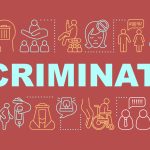
President Joseph Biden, on his first day in office, signed nine executive orders. One of these was Executive Order (EO) 13988, titled Preventing and Combating Discrimination on the Basis of Gender Identity or Sexual Orientation. The EO also addresses overlapping areas of discrimination such as where race or disability and sexual orientation are compounding factors for discrimination. What employers are affected by Executive Order 13988? EO 13988 directs all federal agencies to review their programs, policies, regulations, and documents for …
Read More »
The New York HERO Act
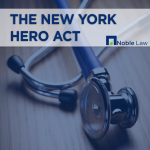
On April 21, 2021, the New York Health and Essential Rights Act, also known as the NY HERO Act, passed both houses and now awaits the signature of Governor Cuomo to become law. The NY HERO Act aims to provide industry specific health protections to all workers. The Act will require all businesses to follow and adopt COVID-19 protection protocols to protect workers from airborne illnesses or face fines. Employers who fail to adopt a relevant plan will be subject …
Read More »
The Global Impact of COVID-19 on Women
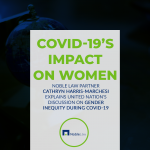
Alongside being a partner and lead New York attorney at The Noble Law, Cathryn Harris-Marchesi is an active member and United Nations delegate with the Commission on the Status of Women (CSW) in New York, which focuses on worldwide issues related to women, children, and gender. After the CSW’s sixty-fifth session (CSW65) at the United Nations in New York, and intense set of high-level discussions lasting two weeks, March 15 through March 26 2021, New York is about to issue …
Read More »
Employer Mandated Vaccine Programs
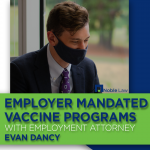
Following up on his discussion with WRAL, associate employment attorney Evan Dancy further explains the implications of employer-mandated vaccine programs. Topics of Discussion: Can an employer institute a vaccine mandate to their employees? What protections are given to employees under the ADA? What if an employee has a disability that prevents them from receiving the vaccine? What is an employee has a sincerely held religious belief that prevents them from receiving the vaccine? Are there any practical considerations employers should …
Read More »
Mandatory Vaccination Programs in the Workplace
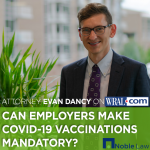
On Thursday, March 12th, The Noble Law’s associate employment attorney, Evan Dancy, appeared on WRAL to explain the legal implications of mandatory vaccination programs in the workplace. Gerald Owens: Can your employer require you to get the COVID vaccine once it’s widely available? It’s an issue that prompts strong emotions from a lot of people. WRAL’s Amanda Lamb looked into this earlier today. Here’s what she found out about the legal ramifications and the potential incentives. Amanda Lamb: 97-year-old Ann …
Read More »

